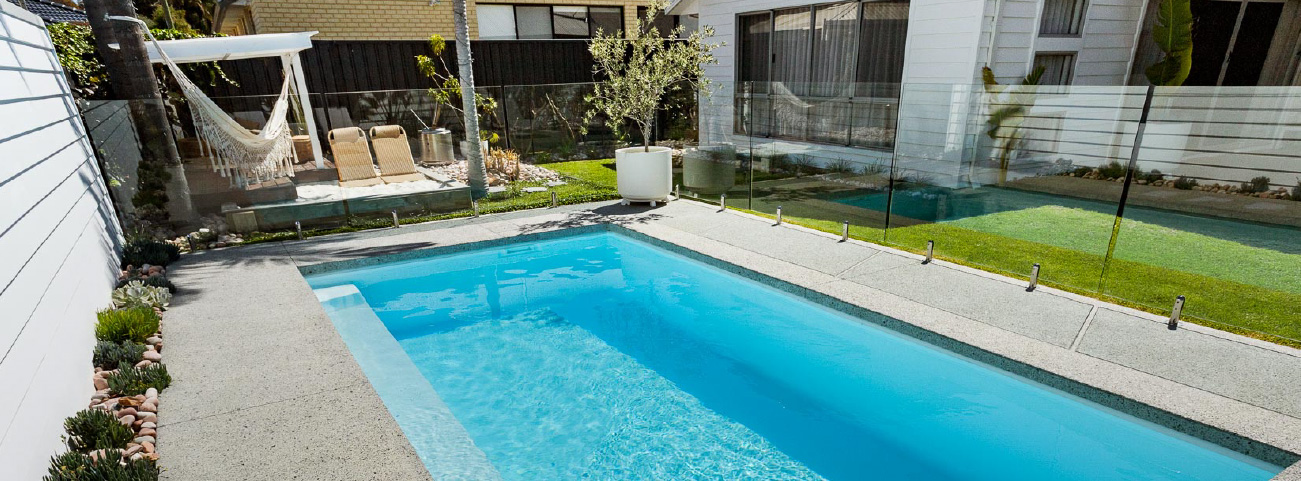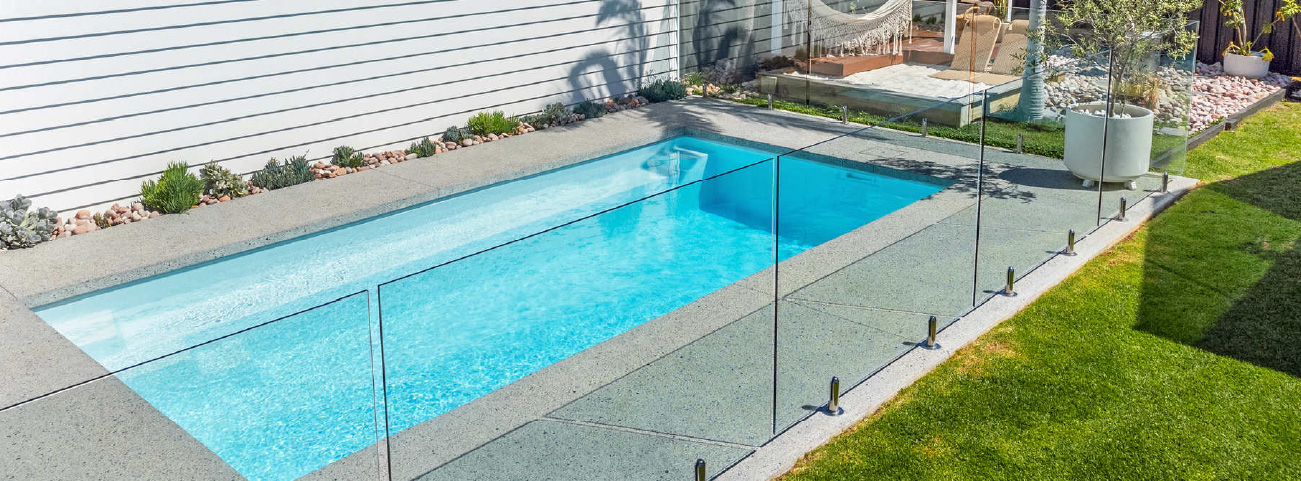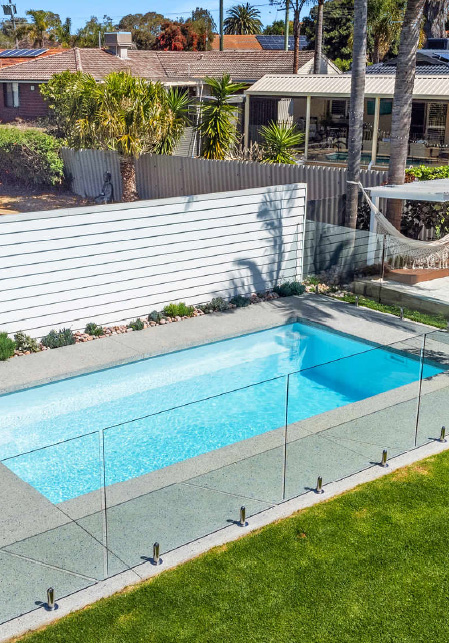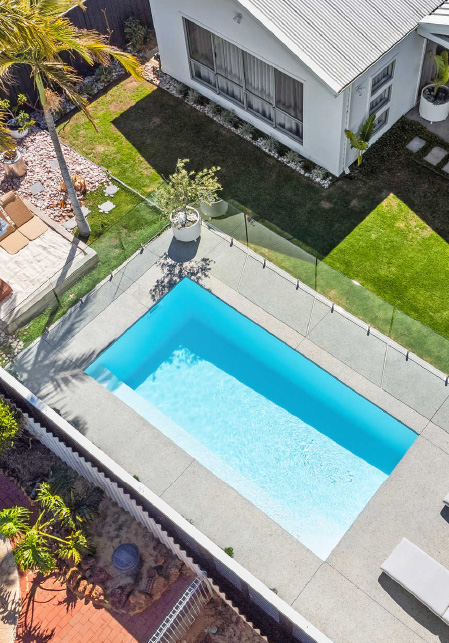Should You Drain Your Fibreglass Pool?
Owning a fibreglass pool is a truly fantastic addition to any home. The sheer luxury of having your personal oasis right in your backyard is hard to compete with. Picture yourself basking in the warm sun, the crystal-clear water inviting you to take a refreshing dip.

However, as a responsible pool owner, there may come a time when you'll wonder whether to drain your fibreglass pool or not. This is a crucial decision that requires careful thought and consideration. The choice you make can have significant implications for the lifespan and condition of your pool, ensuring that it remains a source of joy and relaxation for years to come. So take the time to weigh the options, consult with experts, and make an informed decision that will keep your fibreglass pool in pristine condition. Your personal oasis deserves nothing less!
Why Would You Consider Draining Your Pool?
There are lots of reasons why pool owners may consider draining their pool. One common reason is repairing leaks, which can help maintain the structural integrity of the pool and prevent further damage. Another reason is acid washing, a process that removes stains and buildup to keep the pool looking clean and fresh. Additionally, deep cleaning the pool can be necessary to remove debris and maintain proper water quality. Some pool owners may consider draining their pool in an attempt to reduce their water bill, as refilling the pool with fresh water can be costly. However, before making a decision, it’s important to consider whether draining a fibreglass pool is the best solution.
Risks of Draining a Fibreglass Pool
Draining a fibreglass pool is not a decision to be taken lightly, as it comes with inherent risks that should be carefully considered. The process of draining a pool can potentially cause damage to the pool structure, especially in the case of fibreglass pools, which are more susceptible to cracking or warping when exposed to excessive pressure or weight imbalances. Additionally, the sudden removal of water from the pool can lead to the destabilisation of the surrounding soil, which may result in ground movement or even the collapse of nearby structures. It is crucial to consult with a professional pool technician or contractor who can assess the specific conditions and provide guidance on the safest and most appropriate course of action when it comes to draining a fibreglass pool. Taking the time to thoroughly evaluate the situation and enlist expert advice will help mitigate potential risks and ensure the longevity and integrity of your pool.
Structural Damage
Fibreglass pools are specifically designed to securely contain water, ensuring stability while installed in the ground. The weight of the water acts as a counterbalance, maintaining the pool’s structural integrity. However, when the water is drained, the absence of this pressure can subject the pool to external forces from the surrounding ground. This can potentially cause the pool to shift and result in structural damage, which may require expensive repairs or even necessitate a complete replacement. Hence, it is crucial to be aware of this aspect and take appropriate measures to prevent any detrimental consequences.

Surface Damage
Another potential risk associated with draining fibreglass pools is surface damage. The prolonged exposure to the harsh rays of the sun, combined with frequent temperature changes, can gradually weaken the fibreglass material, making it more susceptible to cracks and warping. These structural issues can lead to irreparable damage to the pool’s surface, compromising its overall integrity and functionality. It is therefore crucial to take necessary precautions and implement proper maintenance practices to ensure the longevity of your fibreglass pool.
Alternatives to Draining Your Pool
When it comes to the risks associated with draining a fibreglass pool, it’s crucial to thoroughly explore alternative solutions that can effectively minimise potential damages and avoid any unnecessary complications that may arise. By carefully considering and evaluating various options, such as utilising advanced drainage systems or implementing additional protective measures, pool owners can ensure the long-term integrity and optimal functionality of their fibreglass pools. These preventive measures not only safeguard against potential risks during the draining process but also contribute to the overall longevity and sustainability of the pool, providing peace of mind to the owners.
Partial Draining
For minor repairs or adjustments, consider partial draining. This maintenance method involves reducing the water level in the pool to maintain a certain amount of weight, which helps prevent potential structural damage. By carefully managing the water level during these repairs, you can ensure the pool’s stability and longevity. It is important to note that this approach is best suited for cooler weather conditions, as it minimises the risk of surface damage caused by excessive heat or direct sunlight.

Professional Pool Services
When it comes to more complex issues, such as leaks, it is highly recommended to consider hiring professional pool services. These experts possess extensive experience and specialised skills required to effectively diagnose and resolve various pool-related problems. With their in-depth knowledge, they can meticulously inspect your pool, identify the source of the leak, and provide targeted solutions to fix it. Moreover, these professionals take extra care to ensure that your pool remains intact throughout the process, eliminating the need for complete draining. By entrusting the job to these knowledgeable and meticulous experts, you can have peace of mind knowing that your pool is in capable hands, and that every detail is being taken care of to maintain its pristine condition.
Water Volume Management
Managing the volume of water in your pool can help to maintain its structural integrity. Regularly checking the water level and adjusting it as necessary can prevent undue stress on the fibreglass. The correct water volume not only ensures the pool’s stability but also optimises the functionality of the filtration and circulation systems.
Regular Maintenance and Cleaning
Consistent and thorough cleaning can prevent the need for draining your pool. By regularly removing debris and balancing the pH levels, you can keep your pool in pristine condition. It’s also important to check the pool’s surface for any signs of damage or wear and take appropriate preventative measures.
Although it may be tempting to view draining your fibreglass pool as a quick fix, it’s important to consider the potential consequences. Draining can actually cause more harm than good, posing risks such as structural and surface damage that far outweigh any perceived benefits. To ensure the preservation of your fibreglass pool, it is advisable to explore alternative solutions and seek professional advice before making any decisions. By making well-informed choices and practising prudent management, you can safeguard the longevity and beauty of your pool for years to come.
Should You Drain Your Fibreglass Pool?
Owning a fibreglass pool is a truly fantastic addition to any home. The sheer luxury of having your personal oasis right in your backyard is hard to compete with. Picture yourself basking in the warm sun, the crystal-clear water inviting you to take a refreshing dip.

However, as a responsible pool owner, there may come a time when you'll wonder whether to drain your fibreglass pool or not. This is a crucial decision that requires careful thought and consideration. The choice you make can have significant implications for the lifespan and condition of your pool, ensuring that it remains a source of joy and relaxation for years to come. So take the time to weigh the options, consult with experts, and make an informed decision that will keep your fibreglass pool in pristine condition. Your personal oasis deserves nothing less!
Why Would You Consider Draining Your Pool?
There are lots of reasons why pool owners may consider draining their pool. One common reason is repairing leaks, which can help maintain the structural integrity of the pool and prevent further damage. Another reason is acid washing, a process that removes stains and buildup to keep the pool looking clean and fresh. Additionally, deep cleaning the pool can be necessary to remove debris and maintain proper water quality. Some pool owners may consider draining their pool in an attempt to reduce their water bill, as refilling the pool with fresh water can be costly. However, before making a decision, it’s important to consider whether draining a fibreglass pool is the best solution.
Risks of Draining a Fibreglass Pool
Draining a fibreglass pool is not a decision to be taken lightly, as it comes with inherent risks that should be carefully considered. The process of draining a pool can potentially cause damage to the pool structure, especially in the case of fibreglass pools, which are more susceptible to cracking or warping when exposed to excessive pressure or weight imbalances. Additionally, the sudden removal of water from the pool can lead to the destabilisation of the surrounding soil, which may result in ground movement or even the collapse of nearby structures. It is crucial to consult with a professional pool technician or contractor who can assess the specific conditions and provide guidance on the safest and most appropriate course of action when it comes to draining a fibreglass pool. Taking the time to thoroughly evaluate the situation and enlist expert advice will help mitigate potential risks and ensure the longevity and integrity of your pool.
Structural Damage
Fibreglass pools are specifically designed to securely contain water, ensuring stability while installed in the ground. The weight of the water acts as a counterbalance, maintaining the pool’s structural integrity. However, when the water is drained, the absence of this pressure can subject the pool to external forces from the surrounding ground. This can potentially cause the pool to shift and result in structural damage, which may require expensive repairs or even necessitate a complete replacement. Hence, it is crucial to be aware of this aspect and take appropriate measures to prevent any detrimental consequences.

Surface Damage
Another potential risk associated with draining fibreglass pools is surface damage. The prolonged exposure to the harsh rays of the sun, combined with frequent temperature changes, can gradually weaken the fibreglass material, making it more susceptible to cracks and warping. These structural issues can lead to irreparable damage to the pool’s surface, compromising its overall integrity and functionality. It is therefore crucial to take necessary precautions and implement proper maintenance practices to ensure the longevity of your fibreglass pool.
Alternatives to Draining Your Pool
When it comes to the risks associated with draining a fibreglass pool, it’s crucial to thoroughly explore alternative solutions that can effectively minimise potential damages and avoid any unnecessary complications that may arise. By carefully considering and evaluating various options, such as utilising advanced drainage systems or implementing additional protective measures, pool owners can ensure the long-term integrity and optimal functionality of their fibreglass pools. These preventive measures not only safeguard against potential risks during the draining process but also contribute to the overall longevity and sustainability of the pool, providing peace of mind to the owners.
Partial Draining
For minor repairs or adjustments, consider partial draining. This maintenance method involves reducing the water level in the pool to maintain a certain amount of weight, which helps prevent potential structural damage. By carefully managing the water level during these repairs, you can ensure the pool’s stability and longevity. It is important to note that this approach is best suited for cooler weather conditions, as it minimises the risk of surface damage caused by excessive heat or direct sunlight.

Professional Pool Services
When it comes to more complex issues, such as leaks, it is highly recommended to consider hiring professional pool services. These experts possess extensive experience and specialised skills required to effectively diagnose and resolve various pool-related problems. With their in-depth knowledge, they can meticulously inspect your pool, identify the source of the leak, and provide targeted solutions to fix it. Moreover, these professionals take extra care to ensure that your pool remains intact throughout the process, eliminating the need for complete draining. By entrusting the job to these knowledgeable and meticulous experts, you can have peace of mind knowing that your pool is in capable hands, and that every detail is being taken care of to maintain its pristine condition.
Water Volume Management
Managing the volume of water in your pool can help to maintain its structural integrity. Regularly checking the water level and adjusting it as necessary can prevent undue stress on the fibreglass. The correct water volume not only ensures the pool’s stability but also optimises the functionality of the filtration and circulation systems.
Regular Maintenance and Cleaning
Consistent and thorough cleaning can prevent the need for draining your pool. By regularly removing debris and balancing the pH levels, you can keep your pool in pristine condition. It’s also important to check the pool’s surface for any signs of damage or wear and take appropriate preventative measures.
Although it may be tempting to view draining your fibreglass pool as a quick fix, it’s important to consider the potential consequences. Draining can actually cause more harm than good, posing risks such as structural and surface damage that far outweigh any perceived benefits. To ensure the preservation of your fibreglass pool, it is advisable to explore alternative solutions and seek professional advice before making any decisions. By making well-informed choices and practising prudent management, you can safeguard the longevity and beauty of your pool for years to come.



